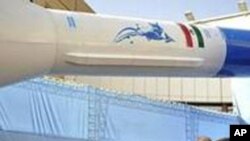Western diplomats on the U.N. Security Council expressed concern Tuesday at mounting reports of Iranian violations of a U.N.-imposed arms embargo, including the seizure of rockets intended for the Taliban in Afghanistan and 50 tons of weapons Israel confiscated en route to Egypt.
Britain’s Ambassador to the United Nations Mark Lyall Grant said Iran’s behavior is part of a pattern of deliberate circumvention of sanctions. He pointed to the seizure last month of 50 rockets in southwestern Afghanistan, saying they were intended to kill Afghan and coalition soldiers.
"Earlier this month, NATO confirmed that weapons seized in a recent operation by Afghan and ISAF [International Security Assistance Force] forces in Nimruz in Afghanistan were supplied by elements within the Iranian regime and were destined for the Taliban," said Lyall Grant. "The detailed technical analysis, together with the circumstances of the seizure, leave us in no doubt that the weaponry recovered came from Iran, despite the fact that they were crudely doctored to make it look as though they originated in a country represented on this council."
The British diplomat said Tehran’s provision of such weapons is at odds with its claim that it supports stability and security in Afghanistan.
Security Council members from the United States, France and Britain also expressed concerns about the cache of weapons Israel’s military seized last week on its way from Syria to Egypt. Israeli officials say the cargo was intended to be smuggled overland to Hamas militants in the Gaza Strip.
German Ambassador Peter Wittig said the large number of violations is cause for concern.
"Many of these cases involve the extensive delivery of weapons from Iran to unstable regions in West Africa and the Middle East," said Wittig.
Late last year, the Council heard reports of Iranian weapons shipments being seized by Italy and Nigeria that reportedly were destined for militants in Gaza and separatist rebels in Senegal.
The U.N. Security Council has imposed four rounds of sanctions against Iran for its suspected nuclear program. Among those measures are prohibitions on Iranian arms exports and imports. Iran has repeatedly denied it is seeking to build an atomic bomb.
Western diplomats note that a recent report by the International Atomic Energy Agency says Iran has refused to discuss possible military dimensions to its nuclear program and has failed to suspend work on heavy water-related projects and uranium enrichment, in violation of Security Council demands.
Western Diplomats: Iran Again Violates Arms Embargo













